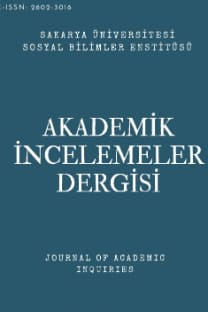Çokkültürlülük Teorisine Çağdaş Katkılar ve Bireysel Haklar-Grup Hakları Ekseninde Çokkültürlülüğü Tartışmak
Çokkültülülük, farklı toplum veya etnisitelerin birlikte yaşama tecrübesi esnasında ihtiyaç duyulan bir teori olmuştur. Gerek göçmen ülkeler, gerek yüzyıllardır birlikte yaşayan toplumlar, ya en başından ya da zaman içinde değişen ihtiyaçlar ve dünyayı algılama biçimleri nedeniyle birlikte yaşama konusunda problem üretmişlerdir. Önceleri monist yaklaşımların ön planda çıktığı düşünce biçimleri yaygın iken, tek tip hayat algısının her toplumu tatmin etmediği görülmüş, çokkültürcü yaklaşımlar ortaya çıkmıştır. Çokkültürlülük bir vaka olarak tarihin her döneminde söz konusu olsa da, bir dünya görüşü ya da ideoloji olarak yenidir. Bu çalışmada, monist yaklaşımları temsil eden klasik liberal görüşler ile çoğulcu yaklaşımları temsil eden çokkültürcü teoriler kıyaslanmış, her iki yaklaşıma yapılan çağdaş katkılar ele alınmıştır.
Anahtar Kelimeler:
Çokkültürlülük, Adaletin Dağıtılması, Bireysel Haklar, Grup Hakları
Contemporary Contributions to Multicultural Theory and Discussing Multiculturalism within the Scope of Individual Rights-Group Rights
Muticulturalism has appeared and needed as a theory while different societies or ethnicities living together. Both immigrant countries and societies which are together for hundreds of years have caused and produced problems about living together either from the very beginning or as new needs and world views have appeared within time. Whereas monist views were common before, it has been discovered later that such philosophies aren’t sufficient for societies and multiculturalist views have appeared. Even though multiculturalism has been a reality throughout history, it is very new as a world view or ideology. In this study, classical liberal views which represent monist side and multicultiralist views that represent pluralist side have been compared and contemporary contributions have been analysed.
Keywords:
Multiculturalism, Distribution Paradigm, Individual Rights, Group Rights,
___
- APPIAH, K. A. (1994) Identity, Authenticity, Survival Multicultural Societies and Social Reproduction, Editor: Amy Gutmann, Multiculturalism, Princeton University Press, USA, p. 149-163.
- BARRY, B. (2002) Culture and Equality, Harvard University Press, USA.
- BENHABIB, S. (2002) The Claims of Culture, Princeton University Press, USA.
- CARENS, Joseph H. (1996) Complex Justice, Cultural Difference and Political Community, Editors: David Miller ve Michael Walzer, Pluralism, Justice and Equality, Oxford University Press, UK, p. 45-66.
- ELSTER, J. (1996) The Empirical Study of Justice, Editors: David Miller ve Michael Walzer, Pluralism, Justice and Equality, Oxford University Press, UK, p. 81-98.
- FRASER, N., AXEL, H. (2003) Redistribution of Recognition?, Verso Books, USA.
- GLAZER, N. (1983) Ethnic Dilemmas, Harvard University Press, USA.
- GUTMANN, A. (1996) Justice Across the Spheres, Pluralism, Justice and Equality, Editors: David Miller ve Michael Walzer, Oxford University Press, UK, p. 99-119.
- HABERMAS, J. (1994) Struggles for Recognition in the Democratic Constitutional State, Editor: Amy Gutmann, Multiculturalism, Princeton University Press, USA, p. 107-148.
- KYMLICKA, W. ( 2001) Politics in the Vernacular, Oxford University Press, UK.
- KYMLICKA, W. (1998) Çokkültürlü Yurttaşlık, Çev., Abdullah Yılmaz, Ayrıntı Yayınları, İstanbul.
- MILLER, D. (1996) Introduction, Editors: David Miller ve Michael Walzer, Pluralism, Justice and Equality, Oxford University Press, UK, p. 1-16.
- ÖZLEM, D., ATEŞOĞLU, G. (2006) Tarih Felsefesi, Doğu Batı Yayınları, Ankara.
- PAREKH, B. (2002) Çokkültürlülüğü Yeniden Düşünmek, Çev., Bilge Tanrıseven, Phoenix Yayınları, Ankara.
- PAREKH, B. (1994) Superior People: The Narrowness of Liberalism from Mill to Rawls, Times Literary Supplement.
- RAWLS, J. (2005) A Theory of Justice, Harvard University Press, USA.
- ROCKEFELLER, Steven C. (1994) Comment, Editor: Amy Gutmann, Multiculturalism, Princeton University Press, USA, p. 87-98.
- ROUSSEAU, J. J. (2009) Toplum Sözleşmesi, Çev., Vedat Günyol, Türkiye İş Bankası Yayınları, İstanbul.
- RUSTIN, M. (1996) Equality in Post-Modern Times, Editors: David Miller ve Michael Walzer, Pluralism, Justice and Equality, Oxford University Press, UK, p. 17-44.
- TAYLOR, Ch. (1994) The Politics of Recognition, Editor: Amy Gutmann, Multiculturalism, Princeton University Press, USA, p. 25-73.
- WALZER, M. (1983) Spheres of Justice, Basic Books Inc., USA.
- WALZER, M. (1994) Comment, Editor: Amy Gutmann, Multiculturalism, Princeton University Press, USA, p. 99-103.
- WALZER, M. (1996) Response, Editors: David Miller ve Michael Walzer, Pluralism, Justice and Equality, Oxford University Press, UK, p. 281-297.
- WOLF, S. (1994) Comment, Editor: Amy Gutmann, Multiculturalism, Princeton University Press, USA, p. 75-85.
- YOUNG, Iris M. (1990) Justice and the Politics of Difference, Princeton University Press, USA.
- YOUNG, Iris M. (2007) Structural Injustice and the Politics of Difference, Editors: Anthony S. Laden and David Owen, Multiculturalism and Political Theory, Cambridge University Press, UK.
- Yayın Aralığı: Yılda 2 Sayı
- Başlangıç: 2006
- Yayıncı: Sakarya Üniversitesi Sosyal Bilimler Enstitüsü
Sayıdaki Diğer Makaleler
Impact of the recent political conflicts on Turkish and turkey images in ısraeli society
Self Oryantalizm: İçimizdeki Modernite Ve/Veya İçselleştirdiğimiz Modernleşme
Osmanlı Devleti’nde Millet Sistem ve Süryaniler
Ebubekir SOFUOĞLU, İlke AKVARUP
Bir Dış Politika Aracı Olarak TİKA
Polyphemos ve Depegöz Hikâyelerinde Canlıların Tasnifi
Çokkültürlülük Uygulaması Olarak Kanada Çokkültürlülüğü
